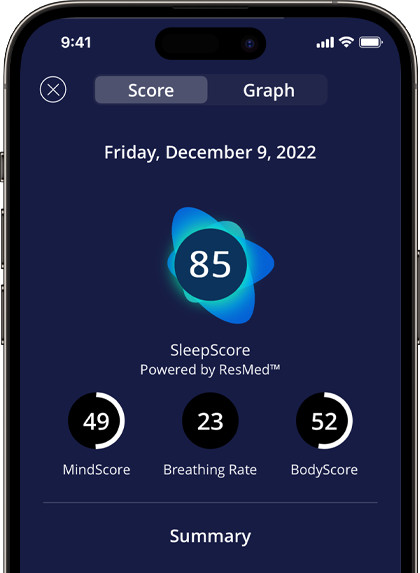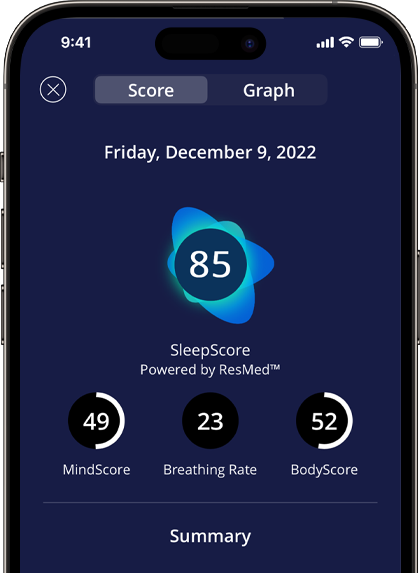SleepScore Labs Reports Findings from Largest National Sleep Study
Highlights:
- 75 percent of people get less than the recommended seven hours of sleep
- Women sleep longer – men average 5 hours, 46 minutes, while women average 6 hours, 11 minutes
- 30 minutes of exercise correlates with 14 extra minutes of sleep per night
- 50 percent of people reported using a mix of two or more sleep aids, such as prescription medications, over-the-counter sleeping pills or herbal remedies/food supplements for sleep
SAN DIEGO, CA – May 2, 2017 – SleepScore Labs™, the world’s leading sleep technology and solutions company, shared key findings based on the largest national sleep study launched in October 2016 in an effort to advance the science and technologies around improved sleep and overall health. The sleep study was developed by SleepScore Labs, ResMed (NYSE: RMD), and “The Dr. Oz Show” to foster better public understanding of sleep health.
More than 25,000 individuals participated in the continuing study that includes sleep monitoring using the clinically proven S+, featuring SleepScore by ResMed™ technology, with more than 2 million nights of consumer sleep data collected to date. From the study, SleepScore Labs analyzed the data for trends and determined America’s national SleepScore of 78 out of 100 from the most comprehensive and accurate collection of high quality home-based sleep data in the world.
SleepScore insights include:
- 75 percent of adults in the study sleep less than the seven hours recommended by the American Academy of Sleep Medicine – Most Americans sleep one hour less than recommended. To put this in context, a recent study by the American Automobile Association (AAA) reported that sleeping as little as one hour less than recommended doubles the risk of a road traffic accident.
- Women sleep longer than men – Men average 5 hours, 46 minutes, while women average 6 hours, 11 minutes.
- Exercise is good for sleep – Any amount is helpful, but the optimal amount in the study is 30 minutes, which correlates with 14 minutes of extra sleep per night.
- Caffeine – Three or fewer cups of coffee didn’t notably affect average sleep time, but those who drank four cups or more slept 26 minutes less.
- Mattresses matter –The type of mattress people sleep on appears to make an average of 20 minutes difference of sleep per night.
- Technology makes a difference – First cuts of the data show a clear benefit from the use of at least some smart sleep and wake lighting systems.
- The S+ works – Poor sleepers who use the S+ increased their sleep by 26 minutes per night.
- Common sleep problems – Waking up in the middle of the night was the most common reported issue with taking too long to fall asleep close behind as a major problem for many Americans.
- Sleep aids – 50 percent of study participants reported using a mix of two or more sleep aids per night, such as prescription medications, over the counter sleeping pills and herbal remedies/food supplements for sleep.
- The 2016 Election and 2017 Inauguration – Americans lost an average of 25 minutes of quality sleep on November 8, 2016, the night of the presidential election. The SleepScore study reported the average SleepScores for November 8 and 9, 2016 were the lowest on record when compared to average SleepScores of 2015 and 2016. The data showed major anomalies and significant changes in sleep times and stress levels on the East and West Coasts and some of the lowest SleepScores recorded since the S+ by ResMed device was launched in October 2014 – 30 percent of those on the West Coast reported elevated stress levels on election night while 24 percent of those monitored on the East Coast reported higher stress levels. Both continue to show elevated stress levels – 17 percent on the East Coast and 10 percent on the West Coast. Shortly after inauguration, January 24 and 25 were the most stressful days in 2017 compared with the previous year – with 17 percent more people reporting stress across the country.
None of the data collected explored political affiliation, so it is not possible to associate elevated levels of stress with any voter groups. SleepScore Labs will be looking more closely at these and other data in the coming months.
“Poor sleep health is a national epidemic linked to multiple chronic diseases, including diabetes, hypertension, stroke, depression and cancer,” said Dr. Mehmet Oz, host of The Dr. Oz Show and co-founder of SleepScore Labs. “We must continue to raise the conversation about how to fix our country’s sleep by sharing insights, such as those gleaned from data collected by SleepScore Labs, in order to empower people to improve their sleep hygiene and overall health.”
“As the largest objective sleep study ever conducted, reaching 2 million nights of detailed accurate consumer sleep data is a significant milestone for the sleep industry in terms of the quality of the insights we’re able to ascertain,” said Colin Lawlor, CEO of SleepScore Labs. “With more than 25,000 people evaluated using SleepScore by ResMed™ technology, that scans 16 times per second every night and calculates a sleep stage every 30 seconds, we give consumers the leading standard of accuracy as well as provide companies the with the ability to evaluate the effectiveness of their sleep products.”
Study Methodology:
Study participants were self-selected and likely participated out of a desire to improve their sleep; that said there were more than 6 percent with no reported sleep issues and optimized sleep. More than 25,000 participants used the S+ by ResMed™ device, the most accurate and comprehensive consumer sleep technology, which objectively measures movement, breathing, light, temperature and assesses sleep stage every 30 seconds during sleep. An additional 23,000 people completed questionnaire that explored lifestyle habits providing additional survey data and insight into practices, stress levels, alcohol, exercise and caffeine intake and various nonbiometric factors. More than 2 million nights of sleep data were assessed using the SleepScore by ResMed technology, measuring more than 12.6 million hours of sleep, which amount to the largest objectively measured consumer sleep study cohort in history.
About S+ by ResMed
For more information about the S+ by ResMed technology, refer to this fact sheet.
About the SleepScore Campaign
For more information on the “2 Million Nights” campaign to find out America’s SleepScore, visit sleepscoredev2.wpengine.com
About SleepScore Labs
SleepScore Labs™ advances the science and technologies around improved sleep and overall health. Together with the foremost medical, health, and scientific experts from around the world, the company utilizes SleepScore™ by ResMed technology to provide the most accurate and advanced sleep improvement system for consumers as well as data insights, product evaluation tools, and technology licensing opportunities for companies developing products and solutions in the sleep industry. Based in Carlsbad, California, SleepScore Labs was created in 2016 as a joint venture between ResMed, Dr. Mehmet Oz, and Pegasus Capital Advisors L.P. to accurately measure sleep while connecting consumers to solutions that help people sleep, feel better and live better. For more information on SleepScore Labs visit www.sleepscorelabs.com.
For more information on the campaign, please visit sleepscoredev2.wpengine.com.
# # #
Contacts:
PR for SleepScore Labs
Tim Sullivan
732-816-0239
t3shamrock@gmail.com



